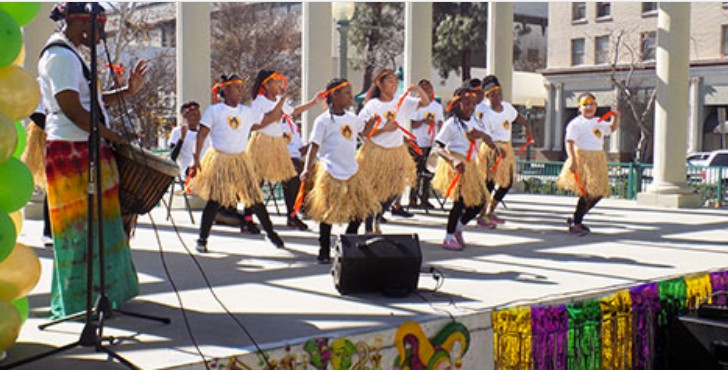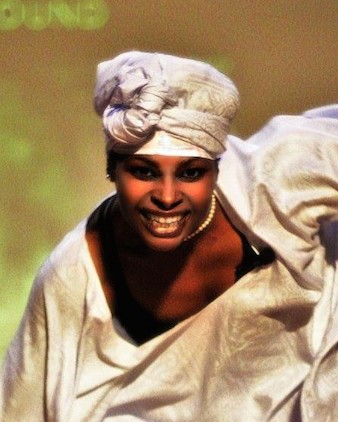We were lucky to catch up with Makeda Kumasi recently and have shared our conversation below.
Hi Makeda, thanks for joining us today. Can you talk to us about a project that’s meant a lot to you?
As a Culture Bearer and an organizer, over the years I have found myself on the administration / business side of Arts and Culture. Being able to secure funding for traditional and non-pop cutural engagement is not an easy task. It has been excitng to draft and pitch ideas for projects that will have an impact on the community to phlanthropic organizations. Most rcently we created a project that has been funded by the Caliifornia Arts Council through Creative Corps Inland Empire.
Our project, “Dancing with the Leaders of the Inland Empire” is an innovative Arts project that engages the community with civic leaders and also addresses Social Justice through performance. Multicultural meets Multimedia for this Dance production which includes screened interviews of Inland Empire leaders and live choreographies of various genres from varied cultures. These shows will be running in Inalnd Empire theaters in June 8th & 15th, 2024.
Another meaningful project that I am engaged with is the 7th Annual Inland Empire’s Ultimate Doundounba Festival sponsored by the University of California, Riverside Department of Dance and the UCR Center for Ideas and Society. This free event immerses the community into West African Drum and Dance through the Friday night Film Screenings and Community Forum, and a full Saturday schedule of classes, workshops, showcases, performances and competitions that are rooted in the strength, wellness and togetherness that is the Doundounba. The two day event will be at UC Riverside May 17th & 18th, 2024.


Makeda, before we move on to more of these sorts of questions, can you take some time to bring our readers up to speed on you and what you do?
I am the founder of WE 3 PRODUCTIONS, as well as the co-founder and artistic director of The Umoja Ensemble of the Inland Empire. I attended Cal Arts before receiving my B.A. in Communications from Cal State, Fullerton, and my M.F.A in Theater from the University of Southern California. I also possesses a MA in Elementary Education, and I am a wife, mother of three children, and a caregiver for my mother.
Along with being a featured performer on stage and T.V., I have danced for two prominent Southern California based African dance ensembles, Abalaye African Dancers; an Orange County Arts Group, and Niancho Eniyaley African Performers. I have been featured on MTV’s Starting Over, BET’s Fly Poet, and the first season of So You Think You Can Dance?, as well as several independent films and theater projects. The Umoja Ensemble of the Inland Empire (UEIE), is a performance collective with a mission to help restore, repair, and regenerate the physical, psychological and spiritual health of the populations we serve, through the preservation, practice, and presentation of African Arts. With over 20 years of program development and facilitation UEIE has been utilized in various private, public and community institutions across Southern California offering a variety of programs to meet the social, economic, and educational needs of our clients including performances, workshops, lectures, curriculum development and facilitation, as well as program consultation.
Although I have taught Performing Arts across the spectrum in K-12 and community centers, being a University of California, Riverside Continuing lecturer in the Department of Dance, I have been able to influence, inspire, and mentor numbers of young students, faculty and staff in Riverside. I have also enjoyed being a Visiting Lecturer in the Department of Theater, Film and Digital Production at UCR, where I directed and choreographed productions of Marisol by José Rivera and Little Shop of Horrors by Howard Ashman. Yet, most recently, I became an adjunct professor in the Performing Arts Department at Long Beach City College (LBCC) where I am able to work with their fabulous Performing Arts and Culture Department. The Dance Ensemble dancers, choreographers and stage craft artists have made it a true joy to work with and choreograph for.
Although, my recent artistic focuses have been completing projects as a 2023 Living Cultures Grantee from the Alliance for California Traditional Arts, as well as being the lead artists in the year long performing arts project titled “Dancing with the Leaders of the Inland Empire”, as a writer I have produced several plays and published two books, I See Hip Hop Africa, (a picture poetry book), and 12 Days in Senegal; An Artist’s Journey (a travel memoir). As a Film Maker I’ve produced music videos and a documentary short, 12 Days in Senegal; An Artist’s Journey Docu-Journal. I am also a contributing writer in the anthology, Dance Adventures:The True Stories of Dancing Abroad, edited by Megan Morrison. In Summer of 2021 I released my first extended play album as a Spoken Word Artist. “A Spoken Word Experience”. You can find the album and music videos for the tracks Maat and Electricity on YouTube and my website, makedakumasi.net. Forward moving, I am also in the process of expanding the tour of my multimedia show, “Urban Djali Tour” which is based on the album. The Urban Djali Tour show features various dance genres, original video, photography and paintings, as well as music from West African instruments that I play, including a 21 string Malian instrument called the kora.


What’s the most rewarding aspect of being a creative in your experience?
The most rewarding aspect of being and artist is the engagement with community. When we do an assembly and or performances. At elementary schools the little children come up to us and want to hug us, and faculty and staff want to take pictures with us. At middle and high schools, teenagers want to have conversations with us about their connections to Africa or how much they liked our moves.
It is rewarding to be an ambassador for a culture and community of people who have been disenfranchised and under appreciated for it’s contributions to the Arts World. It is rewarding to know and be a practitioner of the Arts of our African contemporaries and ancestors. When we end our performances with audience participation there is value in seeing the various ethnicities, races, ages, et. all., participating in a joyful and invigorating community activity. This is the reciprocity that makes the unsavory “business” of Art and the commodification of culture all worth while.


Let’s talk about resilience next – do you have a story you can share with us?
In order to be a practitioner of West African/ Malian Dance as an African American or African born in America, I must be resilient. My skill and ability seems to be tested from every angle and facet of the art and community. I must prove the authenticity of my dance knowledge, demonstrate the movement on a basic and deconstructive approach for non dancers and the culturally ignorant, provide accredited certifications to teach in tertiary institutions, have complete comprehension and the ability to play the rhythms for the movement I teach and perform, display a deep study of the history and context of the traditional and the contemporary aspects of these dances as well.
My determination and love for African and her diasporic arts compels me to continue to perform and teach and learn. I have had community programs where only one person has signed up and paid the fee. I have held drum classes at my home and created a dance studio in my back yard to cut the overhead of venue space. I seek funding and sponsorships from nonprofit and other agencies that allow for the livelihood and lifeblood of myself and the other cultural artists I work with, and be resilient enough not to give up on the Art and communities that I love and engage with.
There have been pockets of times where I have felt bogged down, yet again my love for Art and Culture are the springs that push me forward.


Contact Info:
- Website: makedakumasi.net
- Instagram: MakedaKumasi
- Facebook: Makeda Kumasi
- Linkedin: Makeda Kumasi
- Twitter: Makeda Kumasi
- Youtube: Makeda Kumasi
Image Credits
All photos courtacy of WE 3 PRODUCTIONS archives


